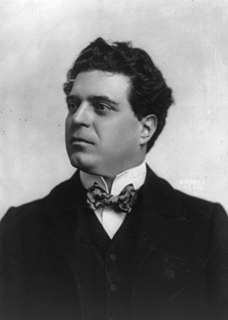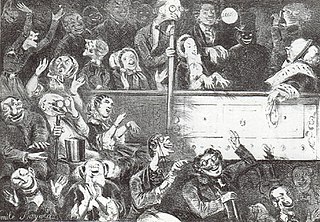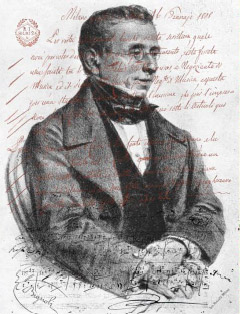
Giacomo Antonio Domenico Michele Secondo Maria Puccini was an Italian opera composer who has been called "the greatest composer of Italian opera after Verdi".

Pietro Mascagni was an Italian composer primarily known for his operas. His 1890 masterpiece Cavalleria rusticana caused one of the greatest sensations in opera history and single-handedly ushered in the Verismo movement in Italian dramatic music. While it was often held that Mascagni, like Ruggiero Leoncavallo, was a "one-opera man" who could never repeat his first success, L'amico Fritz and Iris have remained in the repertoire in Europe since their premieres.

Operetta is a form of theatre and a genre of light opera. It includes spoken dialogue, songs, and dances. It is lighter than opera in terms of its music, orchestral size, length of the work, and at face value, subject matter. Apart from its shorter length, the operetta usually features a light and amusing character while making very controversial political commentaries in response to the oppressive governments and militaries that were present.

Antônio Carlos Gomes was the first New World composer whose work was accepted by Europe. The only non-European who was successful as an opera composer in Italy, during the "golden age of opera", contemporary to Verdi and Puccini and the first composer of non-European lineage to be accepted into the Classic tradition of music.

La fanciulla del West is an opera in three acts by Giacomo Puccini to an Italian libretto by Guelfo Civinini and Carlo Zangarini, based on the 1905 play The Girl of the Golden West by the American author David Belasco. Fanciulla followed Madama Butterfly, which was also based on a Belasco play. The opera has fewer of the show-stopping highlights that characterize Puccini's other works, but is admired for its impressive orchestration and for a score that is more melodically integrated than is typical of his previous work. Fanciulla displays influences from composers Claude Debussy and Richard Strauss, without being in any way imitative. Similarities between the libretto and the work of Richard Wagner have also been found, though some attribute this more to the original plot of the play, and have asserted that the opera remains quintessentially Italian.

Mark William Morris is an American dancer, choreographer and director whose work is acclaimed for its craftsmanship, ingenuity, humor, and at times eclectic musical accompaniments. Morris is popular among dance aficionados, the music world, as well as mainstream audiences.

Gianni Schicchi is a comic opera in one act by Giacomo Puccini to an Italian libretto by Giovacchino Forzano, composed in 1917–18. The libretto is based on an incident mentioned in Dante's Divine Comedy. The work is the third and final part of Puccini's Il trittico —three one-act operas with contrasting themes, originally written to be presented together. Although it continues to be performed with one or both of the other trittico operas, Gianni Schicchi is now more frequently staged either alone or with short operas by other composers. The aria "O mio babbino caro" is one of Puccini's best known, and one of the most popular arias in opera.

Le Villi is an opera-ballet in two acts composed by Giacomo Puccini to an Italian libretto by Ferdinando Fontana, based on the short story Les Willis by Jean-Baptiste Alphonse Karr. Karr's story was in turn based in the Central European legend of the Vila, also used in the ballet Giselle. The opera, in its original one-act version, was first performed at the Teatro Dal Verme, Milan, on 31 May 1884. Le Villi is Puccini's first stage work. It was written for an 1883 competition of one-act operas by the publisher Sonzogno in his periodical Il teatro illustrato, but did not even earn an honourable mention. According to Mosco Carner, this may have been because it was written in such haste that the score was all but illegible. His supporters, who included Arrigo Boito, funded the first production, whose favorable reception led to publication by Giulio Ricordi. Puccini's mother received the following telegram on the night of premiere at the Teatro dal Verme on 31 May 1884: "Theatre packed, immense success; anticipations exceeded; eighteen calls; finale of first act encored thrice"'. Ricordi urged the composer to expand the work, and Puccini did, producing a new version later that year, which was followed by modifications in 1885, and the final version in 1889. A performance typically lasts 64 minutes.

Casa Ricordi is a publisher of primarily classical music and opera. Its classical repertoire represents one of the important sources in the world through its publishing of the work of the major 19th-century Italian composers such as Gioachino Rossini, Gaetano Donizetti, Vincenzo Bellini, Giuseppe Verdi, and, later in the century, Giacomo Puccini, composers with whom one or another of the Ricordi family came into close contact.

The Festival Puccini is an annual summer opera festival held in July and August to present the operas of the famous Italian composer Giacomo Puccini.

Union Avenue Opera is an opera company based in St. Louis, Missouri. The company was founded in 1994 by Scott Schoonover, the music director of Union Avenue Christian Church, which serves as the company's venue in St. Louis' Visitation Park neighborhood.

The Teatro Dal Verme is a theatre in Milan, Italy located on the Via San Giovanni sul Muro, on the site of the former private theatre the Politeama Ciniselli. It was designed by Giuseppe Pestagalli to a commission from Count Francesco Dal Verme, and was used primarily for plays and opera performances throughout the 19th and early 20th centuries. Today, the theatre is no longer used for opera, but is a venue for concerts, plays and dance performances, as well as exhibitions and conferences.

The Nashville Opera Association is a professional opera company in Nashville, Tennessee and is a member of OPERA America. The company currently offers four fully staged opera productions and an educational outreach program during an annual season which runs from October through April. Performances are offered at the Tennessee Performing Arts Center in Downtown Nashville and the Noah Liff Opera Center in the Sylvan Heights section of West Nashville. Designed by architect Earl Swensson, the 26,000-square-foot (2,400 m2) Noah Liff Opera Center houses the company's executive offices, conference facilities, and a rehearsal studio.
Giovanni Bolzoni was an Italian composer and violinist, who is known for his Minuet for String Orchestra.
The Virginia Arts Festival is a Norfolk-based non-profit arts presenter which serves southeastern Virginia, offering dozens of performances during the spring and throughout the year. Virginia Arts Festival performances have included international ballet companies, along with modern, contemporary, and ethnic dance companies; world-renowned soloists and ensembles in musical genres including classical, jazz, world, folk, rock, blues, bluegrass, country, and pop; opera; theater and cabaret; and collaborative productions with local arts organizations like the Virginia Symphony Orchestra.

Francesco Cilluffo is an Italian conductor and composer.
OperaUpClose is a touring opera company, based in London and led by Artistic Director Robin Norton-Hale. The company was founded in 2009 to produce its début production, Robin Norton-Hale's Olivier Award winning, modern adaptation of Puccini's La bohème at The Cock Tavern Theatre.
dell'Arte Opera Ensemble is an opera company in New York City devoted to nurturing emerging singers through rehearsal and performance opportunities, coaching, seminars, and master classes. It was founded in 2000 by opera coach and conductor Christopher Fecteau with the goal of training young opera artists and presenting them in professional productions. Through its Repertoire Development Program, the company features the work of emerging performers, designers, directors and conductors in both standard and rarely-heard masterworks. Several New York premieres have been presented, such as Salieris' "Falstaff," Titus' "Rosina" and Salieri's "La Cifra." In December 2010, the company presented the first performance in New York City of Engelbert Humperdinck's Königskinder since its premiere one hundred years earlier at the Metropolitan Opera.

Flora mirabilis is an opera in three acts composed by Spyros Samaras to an Italian-language libretto by Ferdinando Fontana. Described in the libretto as a Legenda ("Legend"), the opera is an allegorical fairy tale set in medieval Sweden. It premiered at the Teatro Carcano in Milan on 16 May 1886 and was performed again the following year at La Scala. Flora mirabilis was Samara's first opera to be performed outside his native Greece and proved to be his greatest success, playing in multiple opera houses in Italy and abroad.
Il caso Mortara is an opera in two acts composed by Francesco Cilluffo to an Italian-language libretto by the composer himself, inspired by The Kidnapping of Edgardo Mortara by David Kertzer. The opera was commissioned by the Dicapo Opera Theater, New York, and premiered in February 2010. It is the first Italian opera commissioned to an Italian composer by a New York opera company since the times of Giacomo Puccini at the Metropolitan Opera. New York Times critic Anthony Tommasini hailed it as one of the most important events of New York's 2010 operatic season.